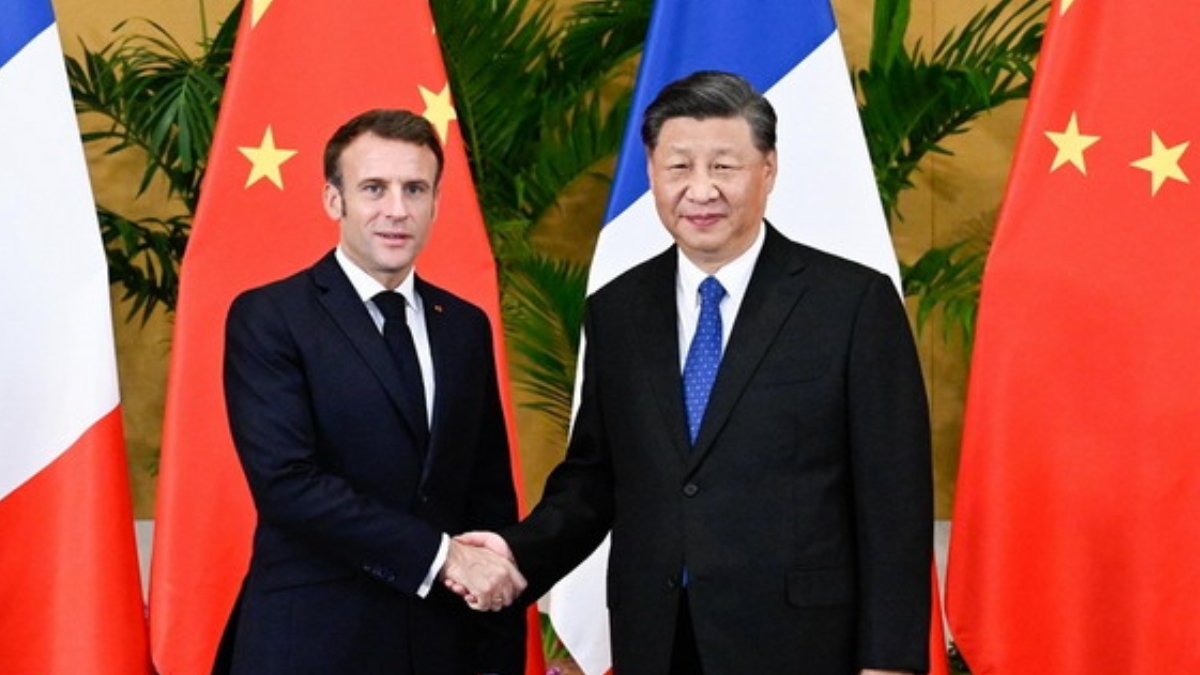When Chinese leader Xi Jinping arrived in France for a state visit, his agenda with French President Emmanuel Macron was packed with critical issues, from trade disputes to the ongoing conflict in Ukraine. The topic of Russia-Ukraine war, in particular, dominated the discussions.
We explain why the war in Europe was a significant talking point during Xi’s visit, decoding the considerations that brought this issue to the forefront of Franco-Chinese diplomacy.
China’s influence over Moscow
Xi Jinping’s relationship with Russian President Vladimir Putin has been notably strong. Beijing and Moscow had signed a “no limits” agreement just before Russia’s invasion of Ukraine in February 2022. This alliance has only deepened as Russia faces growing international isolation due to its actions in Ukraine. With the West distancing itself and imposing sanctions, Russia has increasingly turned to China for support, both diplomatically and economically.
Xi, for his part, has refused to condemn Russia for the attack on Ukraine, despite mounting global pressure.
Following his presidential inauguration on Tuesday, Putin’s first international trip is expected to be to China. That highlights the importance of Beijing in Moscow’s current foreign policy. It also shows the clout and influence China has with Russia.
Macron, as well as other European leaders, understand how important China’s influence would be in talking Russia out of stretching the war any further. This is exactly why the topic of Ukraine is expected to be a common theme in Xi’s upcoming visits to countries like Serbia and Hungary.
Impact Shorts
More ShortsChina’s exports supporting Russia’s war effort
China claims neutrality in the Ukraine conflict. However, its alleged actions tell a different story. Last month, an assessment by the United States revealed that China significantly ramped up its sales to Russia, including critical components like machine tools and microelectronics, which are essential for Russia’s military production.
These components have been used extensively by Moscow to manufacture weaponry used in Ukraine, including missiles, tanks, and aircraft. Notably, about 90 per cent of Russia microelectronics in 2023 came from China.
Chinese and Russian companies have also collaborated on producing unmanned aerial vehicles (UAVs or drones) in Russia. Chinese firms like Wuhan Global Sensor Technology and Hikvision have been implicated in supplying optical components used in Russian military hardware. This level of support has drawn international criticism and led to urgent calls from leaders like Macron for China to cease these activities. Macron’s administration has pressed Xi to “strictly control” sales of products and technologies that could be dual-use, i.e., for civilian and military purposes.
Macron’s interest in Ukraine
Since 2023, Macron’s foreign policy stance has become markedly more hawkish. The French President has been a vocal advocate for Europe’s strategic autonomy, seeking to position Europe as a powerful, independent actor on the global stage, especially in matters of security.
This vision includes reducing dependency on the US and boosting European capabilities to support Ukraine independently.
Macron’s approach to the Ukraine war is driven by this vision. He sees the conflict not just as a regional security issue but as a test case for Europe’s broader strategic ambitions. By actively engaging with leaders like Xi, Macron aims to demonstrate Europe’s, and Frace’s, ability to influence global geopolitics and manage its security interests without over-reliance on American support.
Electoral calculations
Macron’s focus on Ukraine also has to do with attacking and defending attacks from domestic opposition parties. In March, the French far-right Rassemblement National party, led by Marine Le Pen, was 12 points ahead of Macron’s centrist alliance, as reported by Financial Times. Le Pen had, in the past, been quite close to Putin.
On the other hand, the far-left in France has been attackign Macron for being “all talk” about Ukraine. His diplomatic efforts to ease the war-situation is likely also aimed at quelling some of that criticism.
Chinese cooperation remains a challenge
Despite fervent diplomatic efforts, achieving Chinese cooperation on the Ukraine issue has proven to be a formidable challenge. Last year, President Macron made a direct appeal to Xi Jinping, urging him to leverage his influence to “bring Russia to its senses.” However, this plea seemed to have little effect, with no noticeable change in Beijing’s stance or actions following the appeal.
During his time in France, too, Xi did not side with Ukraine. “History has repeatedly proven that any conflict can ultimately be resolved only through negotiation,” he said. “We call on all parties to restart contact and dialogue.”
Given how deep China and Russia’s ties run, it is unlikely that Beijing will switch to a hardline stance, or antagonise Russia publicly. However, the West may still hope for some behind-closed-doors lobbying by China.
With inputs from agencies


)

)
)
)
)
)
)
)
)



